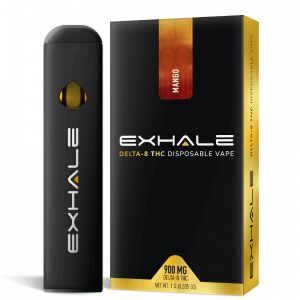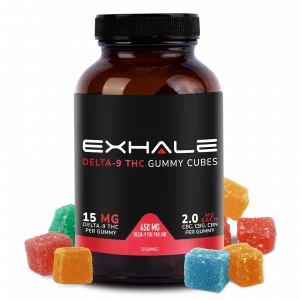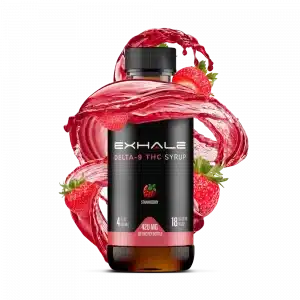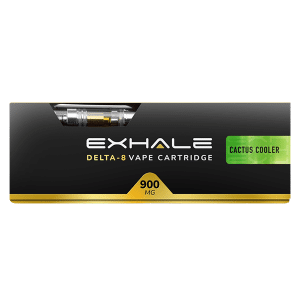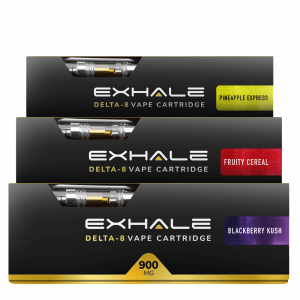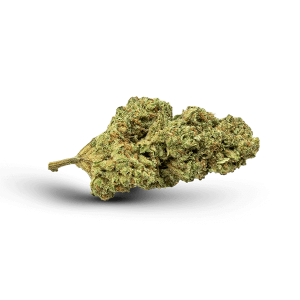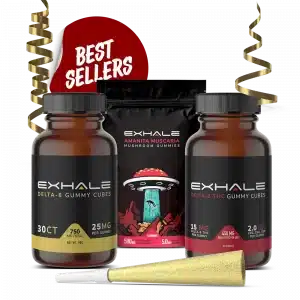CBD and THC are two of the most prominent cannabinoids in today’s cannabis industry. Most people will say the biggest difference between them is their euphoric effects or lack thereof. Whereas THC provides stimulating euphoria, CBD does not. But there are greater differences to consider. This article will provide a comprehensive answer to the question, what is the difference between THC and CBD?
When comparing THC and CBD, the differences go beyond their effects. They also vary in chemical structure, legality, and potential therapeutic properties. We will lay it all out for you so you can determine which one is right for you. Keep reading to find out what is the difference between CBD and THC.
What Is THC?
THC (Delta 9 Tetrahydrocannabinol, Delta 9 THC, Delta 9, D9 THC, D9, or THC) is a naturally occurring cannabinoid known for its euphoric effects. It can be found in both the hemp and marijuana cannabis plants in varying concentrations.
Hemp plants contain 0.3% or less THC. However, the cannabinoid is abundant in marijuana, with some strains exceeding 20% THC. The term THC is interchangeably used with Delta 9. So, there shouldn’t be any confusion when trying to figure out the difference between Delta 9 vs THC, as both are the same thing.

THC’s Effects on the Body and Mind
THC is iconic for its stimulating euphoria. However, it produces various other effects on the body and mind. Here are some of the potential benefits of THC:
- Produces Euphoria. THC enhances relaxation and promotes a sense of euphoria. You may find yourself laughing at things that aren’t usually funny after taking THC. Or you might end up engaging in existential conversations or finally finding the inspiration to finish creative projects.
- Increases Hunger. The compound increases levels of the hormone ghrelin, which promotes hunger. THC also enhances the senses, making food taste and smell better. It may be an effective solution for people who have lost their appetite due to certain medical conditions or have trouble mustering feelings of hunger due to stress.
- Reduces Physical Discomfort. THC is often consumed in the form of medical marijuana for its ability to reduce physical discomfort. In addition to increasing dopamine to decrease physical discomfort perception, it interacts with cannabinoid receptors in your central nervous system to help decrease the body’s response to negative environmental stimuli or sensations related to physical discomfort.
- Decreases Nausea and Vomiting. THC interacts with your body’s endocannabinoid receptors to help decrease stomach discomfort and the urge to vomit. Taking THC may be useful for people who experience upset stomachs due to certain medications or treatments.
Read more: Buy Edibles Online: Legal Options Explored
THC Legality
The Farm Bill of 2018 legalized hemp-based cannabis products with a THC level of 0.3% or less on a federal level. THC sourced from hemp, a cannabis plant with a low THC content, is federally legal. THC sourced from a marijuana plant is not legal by federal law. However, in early 2024, the federal Drug Enforcement Administration (DEA) rescheduled marijuana from a Schedule I drug to a Schedule III drug, which helped to reduce restrictions on the cannabis plant.
It’s important to note that state laws on cannabis vary greatly. Many states align with the Farm Bill, and hemp-derived THC products that meet federal stipulations are allowed for purchase and consumption. Other states allow cannabis regardless of the origin and THC content, while some don’t allow cannabis plants of any kind. Pay attention to your state laws to ensure you don’t get into trouble.
Read more about :What is Delta 8?
THC’s Side Effects
Although THC is mostly beneficial, it can lead to side effects if consumed irresponsibly or taken in excess. Fortunately, these side effects are mild and temporary. They will subside after a few hours. Some side effects of irresponsible THC consumption include:
- Dry Mouth. THC interacts with the CB1 cannabinoid receptors to reduce saliva production and cause dry mouth. Avoid excessive consumption to prevent cottonmouth.
- Red Eyes. The compound expands blood vessels throughout the body. It promotes relaxation but can also cause a red-eyed appearance.
- Anxiousness and Racing Thoughts. THC can promote relaxation but may also produce severe anxiousness and intrusive, racing thoughts when consumed in high doses.
- Lethargy. Although relaxation is a key benefit of THC, you might end up receiving too much R&R. This can result in couchlock, a condition where all you want to do is chill on the couch and not do anything else.
- Drowsiness. Like lethargy, drowsiness is the result of taking too much THC. You’ll end up knocking out and getting some deep, restful sleep, but not at the time or place you would have wanted to.
- Failed Drug Test. THC can cause you to fail a drug test. Refrain from using it 30 days before a drug test to ensure a negative result.
What Is CBD?
CBD (Cannabidiol) is a naturally occurring, non-euphoric hemp plant cannabinoid. It is also present in marijuana but in extremely low concentrations. All of the CBD products you see on the market today are entirely hemp-derived.
Unlike THC, CBD does not have any elevating or “psychoactive” properties. However, it produces various wellness and health benefits. The compound can be enjoyed in several CBD products, including extracts, edibles, oils, vapes, and topicals.
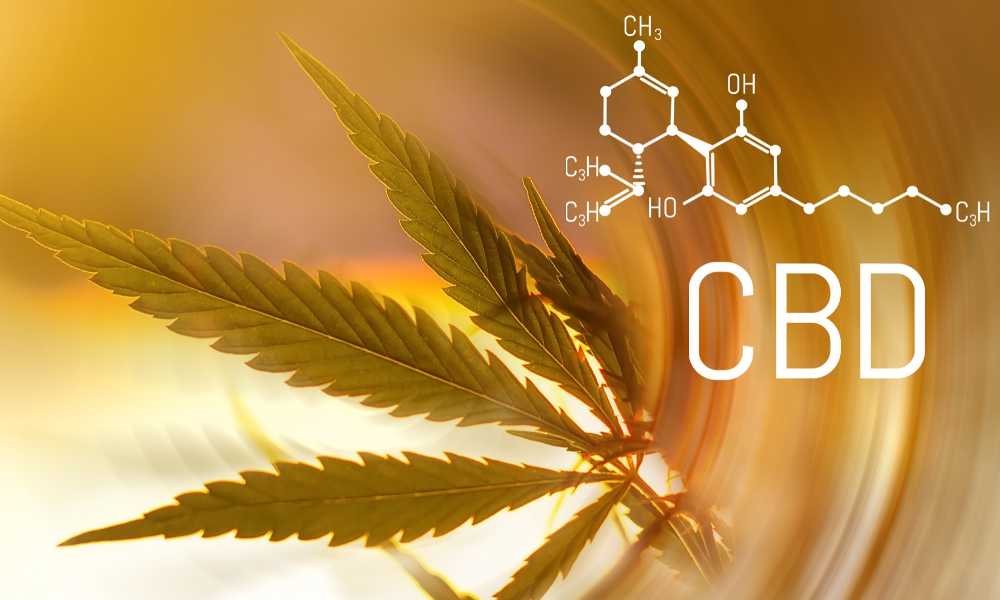
CBD’s Effects on the Mind and Body
CBD has many beneficial qualities that provide a holistic option for those who want to improve their overall wellness. What can CBD do for you? Here’s a sampling of some of the main benefits of this cannabinoid.
- Reduces Anxiousness. CBD interacts with the cannabinoid receptors in the central nervous system to reduce anxiousness. It may help with anxiousness-related conditions and ease racing thoughts.
- Relieves Physical Discomfort and Bodily Stress. Like THC, CBD also interacts with the body’s endocannabinoid receptors to help reduce physical discomfort sensations and symptoms. It is especially effective in treating symptoms related to joint issues and overall soreness.
- Appetite Support. Studies have shown that CBD can elevate and lower appetite. It is said to offer the most effective effects in people with high BMI, while others who are undergoing certain medical conditions say it boosts their appetite.
- Deeper Periods of Relaxation and Sleep. Many take CBD to help them relax, while others take it to promote longer, deeper periods of sleep. These soothing qualities are the reason why many have chosen CBD as a means to cope with rest issues. Although the science behind CBD’s impact on sleep and rest is still in its infancy, the findings are promising.
CBD Legality
Hemp-derived CBD products are legal under federal law as long as they contain 0.3% THC or less. Many states honor federal law. However, some states have their own regulations on the hemp plant and its products. Always check your state’s hemp laws to ensure you stay on the right side of the law.
CBD’s Side Effects
Like THC, CBD may produce side effects if irresponsibly consumed. Always stay within your recommended dosage and never overindulge. If you do, you may face these mild, temporary side effects.
- Dry Mouth. Both THC and CBD interact with the endocannabinoid receptors in your jaw to reduce saliva production and cause dry mouth.
- Lethargy. Although many take CBD to relax, too much of a good thing can be bad. You might find yourself feeling lethargic and not wanting to do anything.
- Drowsiness. CBD can promote relaxation, but it may cause some people to feel drowsy.
- Failed Drug Test. CBD products may contain THC, which can cause you to fail a drug test. Use broad-spectrum or isolate products to ensure you are THC-free.
- Drug Interactions. CBD may interact with other medications. It is known to cause interactions with blood thinners. If you are taking medication, talk to your doctor before adding CBD to your health regimen.
CBD vs THC: Chemical Structure Differences
CBD and THC have similar chemical structures. They both contain 21 carbon atoms, 30 hydrogen atoms, and two oxygen atoms. However, the atoms are arranged differently. THC contains a cyclic ring, while CBD has an open ring structure with a hydroxyl group.
These different chemical structures may not seem like much, but they make a big difference in how the compounds interact with your body’s endocannabinoid receptors. The structure is responsible for THC’s euphoric effects, CBD’s non-psychoactive properties, and the various benefits each compound provides.

CBD vs THC: Which One Is Right for You?
People must consider various CBD and THC properties to decide which one is right for them. Here are some points to think about.
- Personal Goals. Consider what you are looking to get out of your cannabis experience. If your main goal is to reduce anxiousness and promote overall well-being, CBD is a great choice. THC, on the other hand, is optimal for physical discomfort relief and recreational consumption.
- Local Laws and Access. Laws may make certain cannabis products more accessible than others. For example, suppose you are in a state that has not yet legalized medical marijuana or has limitations on hemp-derived THC products. In that case, you may have an easier time accessing CBD.
- Tolerance and Comfort with Euphoric Effects. Some people enjoy THC for its euphoric effects. Others may feel anxious and paranoid when they smoke marijuana or indulge in any THC-based product. You may develop a tolerance for THC and keep your anxiety under control, but some users would rather not deal with it.
Forms of CBD and THC
Various THC and CBD products are on the market. Here are some of the most popular form factors.
- Oils. Also known as tinctures, oils offer ultimate versatility. Consume your dose directly, place a dropper-full under your tongue to experience faster onset of effects, or mix your dose into your favorite food or drinks for a more palatable experience.
- Tinctures. The terms tincture and oils are often confused, but the key difference lies in the base: tinctures use alcohol as the solvent, while oils use a carrier like MCT or hemp seed oil. Cannabis oils are commonly made using CO2 extraction, while tinctures are made by soaking plant material in alcohol to extract cannabinoids.
- Sprays. A spray is a convenient administration method. These products can be applied topically, nasally, or orally. They are often used as a means of on-the-go CBD treatment.
- Flower. Smoking THC and CBD flower offers immediate effects. You can choose from various strains with unique flavors and effects for a tailored experience.
- Vape Products. Portable vaporizers are growing in popularity among the cannabis community because, like smokables, they offer immediate effects but without the harshness of smoke. You can purchase vape carts and disposable vapes to enjoy THC, CBD, or a combination of the two cannabinoids. The rich flavors enhance the experience.
- Edibles. There are various edibles on the cannabis market, including gummies, chocolates, and baked goods. They take a while to hit, but they provide potent effects. Go slow when consuming these products. Consumers wondering what is the difference between CBD and THC edibles need only try these cannabis products for potent and prolonged effects.
- Beverages. Cannabis beverages are the latest trend in cannabis consumption. Both CBD and THC can be added to teas, juices, sodas, seltzers, and lemonades to provide potent effects.

Choosing Between THC and CBD
Choosing between THC and CBD is not easy. You must consider which cannabinoid will be most effective and what your health and wellness goals are. Think about your tolerance level to decide if you can handle THC’s euphoric effects.
Legality is another issue to think about. Products that are legal in your area will be easier to find. You will also reduce your risk of getting into trouble for purchasing and possessing cannabis. Always check with your local laws regarding the purchase, possession, and use of hemp-based CBD and THC products.
Final Thoughts – What Is the Difference Between THC and CBD? [Analyzing 3 Key Factors]
THC and CBD are the most popular products on the cannabis market. The biggest difference may be their euphoric effects or lack thereof. THC promotes euphoria, while CBD does not. However, a deeper exploration of the two cannabinoids reveals other factors that set them apart. You must weigh these variables to determine which is right for your complementary and integrative health and wellness regimen. Both cannabinoids contribute to wellness, but CBD offers a holistic approach to overall mind-body well-being, whereas THC provides a more targeted experience dependent on dosage. CBD primarily eases anxiousness, while THC is often taken recreationally for its euphoric effects.
Hemp-derived products containing CBD and THC are federally legal if their THC content does not exceed 0.3%. Overconsumption of either can lead to temporary side effects such as thirst, cottonmouth, lethargy, and drowsiness. Consider these factors to determine what fits your integrative health and wellness needs. Will you incorporate CBD for daily calm or choose Delta 9 for a blissful experience? Try our CBD + THC Gummies, which offer perfect harmony and comprehensive benefits for the best of both worlds.

